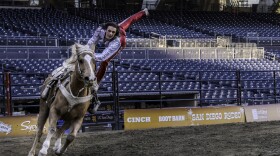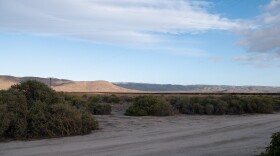ARI SHAPIRO, HOST:
While most of the U.S. was sleeping, tennis players in the Australian Open completed the fourth round last night. On the women's side, the world's No. 1 player, Ashleigh Barty of Australia, advanced to the quarterfinals. And on the men's side, Rafael Nadal of Spain is playing to make history.
Liz Clarke covers sports for The Washington Post and is here to catch us up. Hi there.
LIZ CLARKE: Hi there. So happy we're talking about this.
SHAPIRO: The show went on even without Novak Djokovic, who was barred from Australia over refusing to get the COVID vaccine. Has that affected the arc of play so far?
CLARKE: Happily not, but it certainly affected the run-up. And, you know, the tournament dawned after this terrible rancor and controversy. And players were weary of the topic and ready to get going. But once the tournament started, it's been pretty much all tennis and some really compelling performances.
SHAPIRO: All right. Well, let's talk about a few of the big storylines, starting with Ashleigh Barty, who has won two Grand Slams - the French Open and Wimbledon - but has not yet won on her home turf of Australia. Where does she stand right now? What are her chances?
CLARKE: Oh, she's been looking in great shape. She has yet to drop a set. I don't believe she's lost more than four games in any set. She's had no drama. She is an athlete who is so easy to cheer, beloved not only in Australia, but around the world. It would be such a wonderful narrative for the country if she were to win her first Australian Open.
SHAPIRO: And on the men's side, Spanish champion Rafael Nadal is on a mission to win the most Grand Slams, 21. Do you think this is going to be the year he does it?
CLARKE: Oh, he's got some tough competition. And I do want to say about Nadal - one thing that really distinguishes him - he would never say he's on a mission to win 21. He has missed five months with a chronic foot injury. He had to have surgery. So he entered this tournament, again, with history on the line but really just wanting to win the match in front of him. And with him, that's more than just rhetoric. And he would - you would not engage him in a conversation about is he going to make 21 or not. He just wants to fight for every point, truly, and considers himself lucky to be here.
SHAPIRO: There was also some controversy off the court, with fans wearing T-shirts and holding signs that said, where is Peng Shuai? She's the Chinese tennis player who accused a top government official of sexual assault and then disappeared in November. How has the Australian Open reacted to this?
CLARKE: I think anybody would say horribly. Martina Navratilova called it cowardly. The tennis world has responded with the phrase, where is Peng Shuai? And so some fans appeared at the tournament with that on a banner and with that on their T-shirts. The banner was confiscated. They were told to change T-shirts. The reason they were giving was because no political statements are allowed. And the obvious question being, is this a - seriously a political question? Is it not a human rights question?
SHAPIRO: Is there anyone else here watching for storylines you're excited to be following?
CLARKE: So the remaining eight men - there are two 35-year-olds. The other 35-year-old besides Nadal is Gael Monfils, a Frenchman who, to me, is - has always been one of the most entertaining, must-watch athletes. He's an explosion of color, of creativity, of - plays with intuition. It's a dance literally of joy to watch him play so every round he advances, I rejoice. And I don't think he's going to make it to the finals, but lots of people would cheer.
SHAPIRO: Liz Clarke covers sports for The Washington Post. Thanks for staying up late and watching the competition for us.
CLARKE: Oh, sure. Thank you.
(SOUNDBITE OF MUSIC) Transcript provided by NPR, Copyright NPR.







